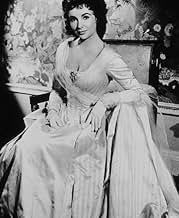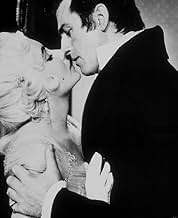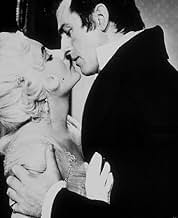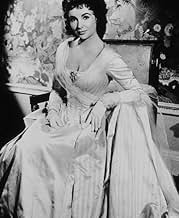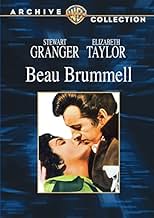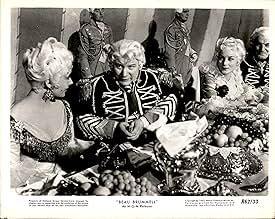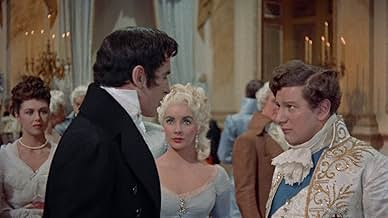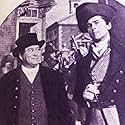NOTE IMDb
6,4/10
1,9 k
MA NOTE
Grandeur et décadence du capitaine George Brummel, dandy et charmeur, courtisan habile et manipulateur de la cour du roi George III et du prince de Galles.Grandeur et décadence du capitaine George Brummel, dandy et charmeur, courtisan habile et manipulateur de la cour du roi George III et du prince de Galles.Grandeur et décadence du capitaine George Brummel, dandy et charmeur, courtisan habile et manipulateur de la cour du roi George III et du prince de Galles.
- Réalisation
- Scénario
- Casting principal
Avis à la une
In the 1950s, VistaVision and Technicolor made way for an entirely new genre of films: historical epics. They'd been made before, but never in vivid color, widescreen ratio, and high resolution. Tons of films came out of the decade, like Ivanhoe, Raintree County, and Beau Brummell. Coincidentally, those all starred Elizabeth Taylor. She just looks lovely in Technicolor, doesn't she?
Beau Brummell is a biopic, about the love-hate friendship between the title character and the Prince of Wales, played by Stewart Granger and Peter Ustinov, respectively. It gets a little wordy, since it was based off a play, but those who like lots of beautiful sets and costumes to look at will be sufficiently distracted. The distraction for everyone will be Elizabeth Taylor, and she sparkles in the few romantic scenes she's given.
It's not a fantastic movie, but it won't hurt you to watch it, if you like historical movies, or the 1800s in particular. If you're not fully invested though, it might get a little boring.
Beau Brummell is a biopic, about the love-hate friendship between the title character and the Prince of Wales, played by Stewart Granger and Peter Ustinov, respectively. It gets a little wordy, since it was based off a play, but those who like lots of beautiful sets and costumes to look at will be sufficiently distracted. The distraction for everyone will be Elizabeth Taylor, and she sparkles in the few romantic scenes she's given.
It's not a fantastic movie, but it won't hurt you to watch it, if you like historical movies, or the 1800s in particular. If you're not fully invested though, it might get a little boring.
Unusual to see Stewart Granger in period costume without a flashing blade, but I found this costume drama on the rise and fall of the Regency dandy and confidante to the then Prince of Wales, eminently watchable. Granger himself shows more acting depth than he was usually allowed in the swashbuckling actioners he frequented and is well cast as the proud, aspiring but ultimately over-ambitious George "Beau" Brummell, whose loose tongue and haughty wit ultimately saw him cast out of high society into a life of penury in France, on the run from his numerous creditors. However the real acting plaudits unquestionably lie with Peter Ustinov, who again, like his portrayal of Nero in "Quo Vadis", easily demonstrates his character, the king-in-waiting Prince George's initially fey and petulant ways but later conveys the depth of character of a man who matured into his kingship and his conflicting loyalty which turns to generous magnamity to best friend but loose cannon Brummell. Robert Morley gets to act a fine cameo performance as the mentally ill King whose condition leads to the Regency crisis and Elizabeth Taylor gets to wear some elaborate costumes not to mention hairstyles as Lady Belham, torn between her passionate attraction to Brummell's rebellious individual and the safe society gentleman Lord Edwin Mercer played stoically by James Donald. Historical figures of the day flit in and out of the narrative, but surely the "mad, bad and dangerous to know" Lord Byron should have been played with more zest and by a more handsome actor than we get here. The sets and costumes are sumptuous, the direction steady if uninspired, (for example, an intimate dialogue scene between Granger and Taylor pans back and forth unimaginatively between their faces with every sentence spoken). The dialogue while well-written and rarely trivial, does get bogged down in speechifying, forced wit and point-scoring which gets decidedly stultifying at times. The key scene were Brummell rashly insults the Prince is well staged and played and the viewer is left in no doubt that the bold Brummell has gone too far this time, prefiguring the fate of another high society dandy from a later generation, the writer Oscar Wilde. Having read a little background on the real Brummell's life, I'm aware that the usual Hollywood bowdlerisation has occurred (nowhere did I read of the Prince when King's final reconciliation with the broken Brummell in France), but it makes for a good finish to a meatier costume drama than I might have expected given the subject and personnel involved.
George Bryan "Beau" Brummell (1778-1840) was a leader of fashion in Regency England and a close friend of the Prince Regent, although they eventually quarrelled. Brummell was eventually forced to leave Britain because of debts and spent the latter part of his life in poverty in France. He appears to have a considerable influence on the men's fashions of his day, helping to popularise cravats, trousers instead of knee-breeches, natural hair instead of wigs and to make fashionable the restrained, sober elegance which was to be the keynote of gentlemen's costume in the nineteenth century in place of the ostentatious dandyism of the eighteenth. Outside the field of gents' tailoring, however, he was not a figure of any great historical significance, so it is perhaps not surprising that this film is not an academically serious biopic, but rather a celebration of a colourful figure in a colourful age.
The film is far from being historically accurate, especially as regards chronology. The events depicted here (the Regency Crisis of 1788, the Prince's marriage to Caroline of Brunswick, Brummell's rise in the Prince's favour, his fall from grace, the death of King George III in 1820 and Brummel's own death in 1840) historically cover a period in excess of fifty years, but here they are presented as occurring over a much shorter timescale. Rather oddly, the villain of the piece is William Pitt the Younger, widely regarded as one of Britain's greatest Prime Ministers but presented here as a cunning, power-hungry schemer who refuses to allow King George III to be certified as mad (although he quite obviously is) in order to protect his own power. (The relationship between Pitt and the King depicted here more closely resembles that between the Austrian Chancellor Prince Metternich and the feeble-minded Emperor Ferdinand I who, for political reasons, was never declared to be insane). In reality Pitt died in 1806, but here he is shown as outliving not only George III but also Brummell.
The film's politics are, in fact, rather inconsistent. Early on, Brummell, whose family although wealthy are of fairly humble stock, is portrayed as something of a radical filled with the spirit of the French Revolution and complaining about the class divisions within British society. Later on, however, he becomes as the Prince's friend an arch-reactionary, encouraging the future George IV to defy Parliament and to rule more as an autocrat than as a constitutional monarch. Brummell's justification for this apparent change of heart is that he feels that the Prince will make an admirably liberal ruler, far more liberal than Pitt, but the character played by Peter Ustinov does not really make us feel that this confidence is well-founded.
Stewart Granger was known for playing dashing heroes in costume dramas, so was well-suited to the lead role, although it contains less in the way of physical action than some of his other parts from this period. Ustinov gives a good comic performance as the petulant, self-pitying Prince, and Robert Morley a more serious one as the mad old King. I was, however, surprised to see Elizabeth Taylor, already a major star in her early twenties, in a comparatively minor role. She plays Brummell's love-interest Lady Patricia Belham, although he eventually loses her to another man. Apparently Lady Patricia, a fictitious character not found in the play on which the screenplay was based, was inserted to allay any suspicions on the part of the ultra-puritanical American censors that the friendship between Brummell and the Prince might be homosexual in nature.
"Beau Brummell" is not the sort of film which is likely to please the historian, but then it was never intended to. It was clearly intended as an enjoyable period romp and, to some extent, still works on that level. 6/10
The film is far from being historically accurate, especially as regards chronology. The events depicted here (the Regency Crisis of 1788, the Prince's marriage to Caroline of Brunswick, Brummell's rise in the Prince's favour, his fall from grace, the death of King George III in 1820 and Brummel's own death in 1840) historically cover a period in excess of fifty years, but here they are presented as occurring over a much shorter timescale. Rather oddly, the villain of the piece is William Pitt the Younger, widely regarded as one of Britain's greatest Prime Ministers but presented here as a cunning, power-hungry schemer who refuses to allow King George III to be certified as mad (although he quite obviously is) in order to protect his own power. (The relationship between Pitt and the King depicted here more closely resembles that between the Austrian Chancellor Prince Metternich and the feeble-minded Emperor Ferdinand I who, for political reasons, was never declared to be insane). In reality Pitt died in 1806, but here he is shown as outliving not only George III but also Brummell.
The film's politics are, in fact, rather inconsistent. Early on, Brummell, whose family although wealthy are of fairly humble stock, is portrayed as something of a radical filled with the spirit of the French Revolution and complaining about the class divisions within British society. Later on, however, he becomes as the Prince's friend an arch-reactionary, encouraging the future George IV to defy Parliament and to rule more as an autocrat than as a constitutional monarch. Brummell's justification for this apparent change of heart is that he feels that the Prince will make an admirably liberal ruler, far more liberal than Pitt, but the character played by Peter Ustinov does not really make us feel that this confidence is well-founded.
Stewart Granger was known for playing dashing heroes in costume dramas, so was well-suited to the lead role, although it contains less in the way of physical action than some of his other parts from this period. Ustinov gives a good comic performance as the petulant, self-pitying Prince, and Robert Morley a more serious one as the mad old King. I was, however, surprised to see Elizabeth Taylor, already a major star in her early twenties, in a comparatively minor role. She plays Brummell's love-interest Lady Patricia Belham, although he eventually loses her to another man. Apparently Lady Patricia, a fictitious character not found in the play on which the screenplay was based, was inserted to allay any suspicions on the part of the ultra-puritanical American censors that the friendship between Brummell and the Prince might be homosexual in nature.
"Beau Brummell" is not the sort of film which is likely to please the historian, but then it was never intended to. It was clearly intended as an enjoyable period romp and, to some extent, still works on that level. 6/10
Of all the influences of men's fashion created during the 1800s, none ever compared with the flashes of inspirations set by George Bryan Brummell. This film entitled " Beau Brummell " is a superficial look at the man and his statements of life and fashion. Born in London, educated at Eton and for a time, a close friend of King George IV, Brummell rubbed shoulders with the rich and powerful, despite the fact, he was unfortunately, neither. Stewart Granger portrays Beau Brummell with a nonchalant but superior attitude and with the smug style of the up-and-coming, man-a-bout-town. Although, not in his actual life, Elizabeth Taylor plays Lady Patricia Belham, a woman of culture, breeding and social stature, who remains as elusive as Brummell's financial aspirations. Peter Ustinov plays the Prince of Wales and future King of England with convincing style and ease. Robert Morley, James Donald and James Hayter as Mortimer add to the fine cast as does Noel Willman who plays Lord Byron. As a result, this film may not exercise the accurate truth of the great Dandy of England, but does set the regal stage with which the real Beau Brummell was accustomed to. An excellent adaptation and recommended to all who wish to study the man, the times and the incredible influences he had in his day. ****
Beau Brummell was the leading dandy of his age, determining the fashion of men for centuries to come. Lord Byron called him the greatest man of his age, and yet he never made any pretensions to be something special. He just showed men how to dress properly and distinctly, doing away with all the exaggerated foppishness of 18th century fashion. Stewart Granger makes one of his best performances and makes Beau Brummell quite a credible character of consistent honesty, while the prize goes to Peter Ustinov as the prince of Wales, later George IV, who crowns the film by his formidable character of both humour and wit and pathetic awkwardness. Robert Morley plays his father, the mad king George III and has only one great scene, but that's the centre of the play and perhaps what you will be least likely to forget. Nigel Hawthorne made an entire film on this theme, but yet Robert Morley's brief appearance of the same character is more impressive. The main asset of the film though is the brilliant dialog, which sparkles with wit, spirituality and cleverness perpetually, and you will find it worth watching the film all over again just to concentrate on relishing the splendid dialog. Some would find the film overburdened with talk and miss the usual swashbuckling action of Stewart Granger, but he himself always desired to play more parts like this and less of the action virtuoso. Elizabeth Taylor was not yet a great actress at this point, but she nevertheless shines with her diamond beauty. The greatest credit goes to the script writers.
Le saviez-vous
- AnecdotesThis movie had troubles with the U.S. censor, the Production Code Administration, because of the apparent justification of the immoral relationship between the Prince of Wales, played by Sir Peter Ustinov, and Mrs. Fitzherbert, played by Rosemary Harris, because a steward at a gentlemen's club had the manner of a "sex pervert", because the Prince checks the gender of a dog, and because of the use of the word "damn". Changes were made, but the running time remained the same.
- GaffesThe final meeting between a dying Brummell and George IV is fiction, as the King declined the meeting and Brummell was not on his deathbed at the time. He outlived George IV by ten years.
- Citations
Beau Brummell: [to Patricia] Please stay. We want each other. Think of the story you can tell our grandchildren.
- ConnexionsFeatured in Elizabeth Taylor - An Intimate Portrait (1975)
- Bandes originalesMilanollo
(uncredited)
Music by Johann Valentin Hamm
Meilleurs choix
Connectez-vous pour évaluer et suivre la liste de favoris afin de recevoir des recommandations personnalisées
- How long is Beau Brummell?Alimenté par Alexa
Détails
Box-office
- Budget
- 1 762 000 $US (estimé)
- Durée1 heure 53 minutes
- Couleur
Contribuer à cette page
Suggérer une modification ou ajouter du contenu manquant

Lacune principale
By what name was Le beau Brummel (1954) officially released in India in English?
Répondre

